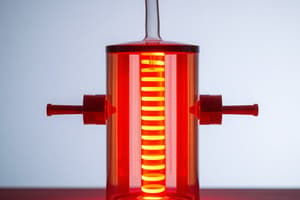Podcast
Questions and Answers
What do heat engines convert into mechanical energy?
What do heat engines convert into mechanical energy?
- Heat energy into mechanical energy (correct)
- Heat into light
- Electricity into heat
- Kinetic energy into potential energy
What is the primary focus of thermodynamics?
What is the primary focus of thermodynamics?
- Exploring the relationships between heat and other forms of energy (correct)
- Studying the behavior of objects under various conditions
- Developing modern technology and engineering
- Understanding the nature and properties of matter and energy
Which field of science studies the behavior of matter and energy?
Which field of science studies the behavior of matter and energy?
- Engineering
- Biology
- Physics (correct)
- Thermodynamics
What is the most efficient way to convert heat into work?
What is the most efficient way to convert heat into work?
How is heat usually measured?
How is heat usually measured?
What is the Carnot cycle used to explain?
What is the Carnot cycle used to explain?
In which application is thermodynamics used to understand and optimize chemical reactions?
In which application is thermodynamics used to understand and optimize chemical reactions?
Which process involves removing heat from a system to lower its temperature?
Which process involves removing heat from a system to lower its temperature?
What measure does entropy represent in thermodynamics?
What measure does entropy represent in thermodynamics?
Which field uses thermodynamics to design and optimize spacecraft for travel through space?
Which field uses thermodynamics to design and optimize spacecraft for travel through space?
Flashcards are hidden until you start studying
Study Notes
Introduction to Physics
Physics is the fundamental science that studies the nature and properties of matter and energy. It is concerned with the behavior of objects under various conditions, such as motion, forces, energy, and heat. The science of physics has been developed over centuries through the contributions of many scientists and scholars, and it is considered one of the cornerstones of modern technology and engineering.
Thermodynamics
Thermodynamics is a subfield of physics that deals with the relationships between heat and other forms of energy. It is an essential part of many engineering and technological applications. Here are some key concepts in thermodynamics:
-
Heat: Heat is a form of energy that is transferred from one body to another due to a temperature difference. It is often measured in terms of calories or joules.
-
Temperature: Temperature is a measure of how hot or cold an object is. It is usually measured in degrees Celsius (°C) or Fahrenheit (°F).
-
Heat engines: Heat engines are devices that convert heat energy into mechanical energy. They are commonly used in power generation and transportation.
-
Carnot cycle: The Carnot cycle is an idealized thermodynamic process that can be used to explain the efficiency of heat engines. It is based on the principles of reversible heat engines and is considered the most efficient way to convert heat into work.
-
Entropy: Entropy is a measure of the disorder or randomness of a system. It is often used to describe the direction of spontaneous processes, such as the flow of heat from a hot object to a cold one.
-
Refrigeration: Refrigeration is the process of removing heat from a system to lower its temperature. It is used in applications such as air conditioning and refrigeration.
-
Heat transfer: Heat transfer is the process of transferring heat energy from one location to another. It can occur through conduction, convection, or radiation.
Applications of Thermodynamics
Thermodynamics has numerous applications in various fields, including:
-
Energy production: Thermodynamics is used to design and optimize power plants, such as nuclear reactors and fossil fuel power plants, to convert heat energy into electricity.
-
Transportation: Thermodynamics plays a crucial role in the design and optimization of engines for vehicles, including cars, trucks, and airplanes.
-
Air conditioning and refrigeration: Thermodynamics is used to design and improve the efficiency of air conditioning systems and refrigeration equipment.
-
Chemical processes: Thermodynamics is used to understand and optimize chemical reactions, such as those used in manufacturing processes and biochemical reactions in living organisms.
-
Space exploration: Thermodynamics is used to design and optimize spacecraft for travel through space, where temperature extremes and energy limitations are common.
Conclusion
Physics is an essential science that has numerous applications in various fields, including thermodynamics. Thermodynamics, a subfield of physics, deals with the relationships between heat and other forms of energy, and it is an essential part of many engineering and technological applications. By understanding the principles of thermodynamics and its applications, we can design and optimize systems for energy production, transportation, air conditioning, refrigeration, chemical processes, and space exploration.
Studying That Suits You
Use AI to generate personalized quizzes and flashcards to suit your learning preferences.




